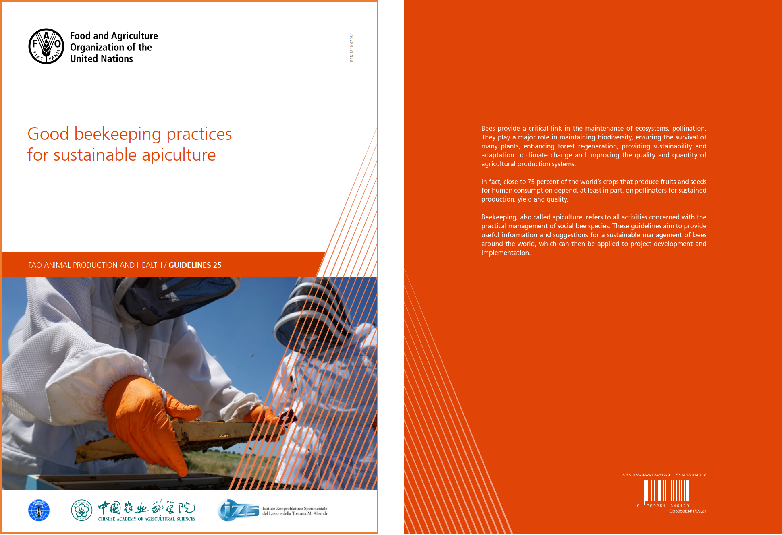Launch of Good beekeeping practices for sustainable apiculture
Date:2022-04-13

The world is facing many challenges with regards to food security and sustainable agricultural practices, bees and pollinators are playing a key role in the background, providing us a better ecosystem.
In many parts of the world, beekeeping or apiculture is a widespread activity, with thousands of small-scale beekeepers depending on bees for their livelihoods. Beekeeping, also called apiculture, refers to all activities concerned with the practical management of social bee species. Social bees can provide humans with valuable hive products (honey, wax, propolis, pollen, royal jelly, queen bees and swarms) and services (pollination, apitherapy, apitourism and environmental monitoring) and play other important economic, cultural and social roles.
With the support of Apimondia, the Chinese Academy of Agricultural Sciences (CAAS), the Apicultural Science Association of China (ASAC) and the Istituto Zooprofilattico Sperimentale Lazio e Toscana (IZSLT) and many international bee experts FAO produced guidelines on Good beekeeping practices for sustainable apiculture.
The guidelines were launched in a virtual event attended by over 550 participants from over 100 countries around the world.
Good beekeeping practices for sustainable apiculture [PART 2]
On this occasion, while opening the event Selvaraju Ramasamy, Head of FAO’s Research and Extension Unit, highlighted FAO’s work on good beekeeping practices “Beekeeping can play a vital role in some of the challenges we face today, for improving yield and quality of agricultural crops, improving food production and security, and providing a source of decent jobs and income.”
Jeff Pettis, President, Apimondia shared, “We need healthy sustainable beekeeping because bees enrich our lives in many ways. We can survive on rice, corn and wheat but we thrive on the fruits nuts and vegetables that bees add to our diet by pollinating many vital crops.”
Zhang Yahu, Representative of CAAS appreciated FAO for taking efforts to make this collaboration possible, and for the overall guidance. He further added, “CAAS is willing to further strengthen cooperation with FAO, Apimondia, IZSLT, as well as apiculture researchers and beekeepers all over the world, to share stories and good beekeeping practices, and to contribute our wisdom to achieve the SDGs.”
Romano Zilli representing IZSLT also shared how beekeeping has been a priority area for the institute, and said ‘Sustainable beekeeping practices are key for the success of production as well-being humans, animals and the planet.”
Cleofas Rodriguez Cervancia, one of the guidelines author, shared many interesting experiences from Asia region, urged the audience for conservation and sustainable management of native bees, "They are resilient to climate change, pest and diseases and fit pollinators of local plants."
Another author peaking at the event, David Mukomana shared examples from Africa and added “With improved and good beekeeping practices being adopted, Africa offers the best environment for commercial beekeeping done the natural way.”
The guidelines provide insights into the different management practices of the various social species of bees and aim to provide useful information and suggestions for project design teams, national programme managers and policymakers who want to improve the sustainability of beekeeping worldwide.
Roswitha Baumung, Technical Officer and the FAO lead for the guidelines concluded that good beekeeping practices directly contribute to the achievement of the 2030 Agenda by supporting the shift towards more efficient, inclusive, resilient and sustainable agrifood systems. She added, “They contribute directly to FAO's strategic framework with its four betters: better production, better nutrition, better environment and better lives.”
(https://www.fao.org/pollination/resources/news/detail/en/c/1480935/)